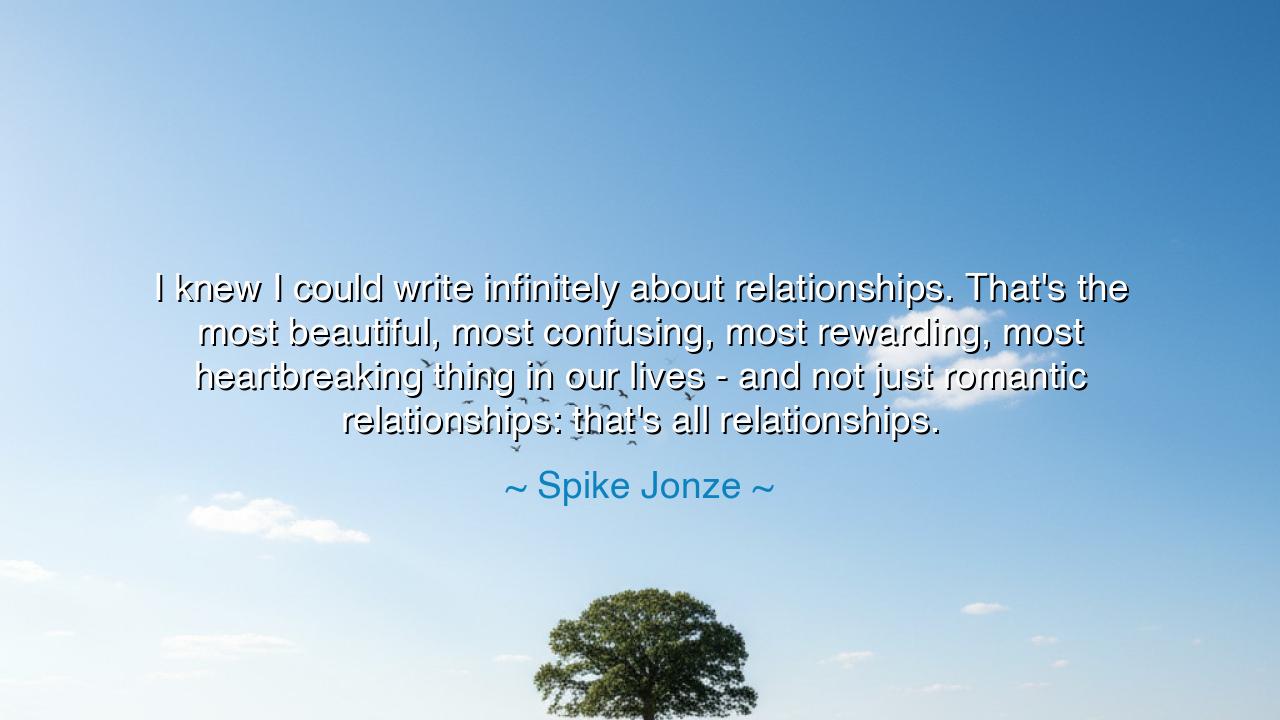
I knew I could write infinitely about relationships. That's the
I knew I could write infinitely about relationships. That's the most beautiful, most confusing, most rewarding, most heartbreaking thing in our lives - and not just romantic relationships: that's all relationships.






"I knew I could write infinitely about relationships. That's the most beautiful, most confusing, most rewarding, most heartbreaking thing in our lives - and not just romantic relationships: that's all relationships." These words, spoken by Spike Jonze, carry the weight of human experience in them. They speak to the very essence of what it means to connect with another person—whether through love, friendship, or even the bond we share with family. Jonze touches on something universal, something that transcends time and place. Relationships, in their myriad forms, are the fabric of our lives, weaving together moments of joy, sorrow, triumph, and loss. It is in relationships that we find our truest selves, but it is also in them that we often face the deepest challenges.
Since the beginning of human history, relationships have been the central focus of our stories, our struggles, and our triumphs. The ancient myths are filled with bonds of love and betrayal, friendships and rivalries that define the fate of kingdoms and empires. Achilles and Patroclus, whose relationship defined the tragic depth of the Iliad, illustrate how a bond between two souls can alter the course of history. But even in such great moments, the complexities of their relationship—the beauty, the tension, the heartbreak—were not just the stuff of epic tales but were woven from the very threads of human connection. From the fierce loyalty of Achilles to the tragic sacrifice of Patroclus, we see that relationships shape not only our personal lives but also the very destiny of nations.
It is no different today. Jonze’s words resonate deeply in an era where relationships—from romantic to familial to professional—are often tested in ways we never imagined. Love, in its most intimate form, can be the most beautiful, the most confusing, the most rewarding experience in our lives. But it can also bring us to the brink of despair. Think of the relationship between Romeo and Juliet—two young lovers bound by fate, their love the pinnacle of beauty and tragedy. Their story is not merely the tale of romantic love; it is about the force of human connection, the consequences of family loyalties, and the destructive power of misunderstanding. In their deaths, the families are reconciled, and the city of Verona is changed forever. The most profound relationships often contain contradictions, where love and heartbreak coexist.
However, relationships are not only limited to the romantic realm. The connection between parents and children, the bond between friends, and even the complex ties between rulers and their subjects carry with them the same depth and complexity. Mahatma Gandhi’s relationship with the people of India is a powerful example. His leadership was not built on authority alone, but on the trust and affection he garnered from the people, fostering a relationship that was as deep as it was transformative. Gandhi’s love for his country and his people, coupled with his belief in nonviolence and truth, shaped the very fabric of modern India. His relationships were built on deep moral convictions, but also on the human connections that are born from respect and compassion.
We also see this truth in the lives of great artists who have struggled with their personal relationships. Consider Vincent van Gogh, whose tumultuous relationships with his brother Theo and his own sense of isolation are captured in his letters. Vincent’s genius, his art, was deeply tied to the relationships he had, not just with others, but with himself. His paintings were often an expression of the loneliness and longing he felt for connection, yet they also captured the beauty and richness of human life. In his heartbreaking isolation, the relationship he had with his art became the most important one he could sustain. The joy and sorrow he poured into his work are, in many ways, a reflection of the complex, often painful, relationships we all face.
Jonze reminds us that relationships are never simple. They are not easily categorized, nor are they bound by easy answers. The lesson here is that human connection—whether in love, family, or friendship—is at once the most beautiful and most difficult aspect of our lives. The richness of relationships comes not from their perfection, but from their complexity. We are all intertwined with others, each person’s actions shaping and molding the course of our own journey. It is through the challenges we face in relationships—whether it is the tension of unspoken words, the joy of shared moments, or the heartbreak of loss—that we find meaning in our lives.
In your own life, embrace the complexity of your relationships. Understand that the deepest bonds are not those that are simple or free from conflict, but those that are rich with meaning, built on trust, and nurtured through time. Like Jonze, recognize that relationships—in their raw, unvarnished form—are the most powerful force in our lives. They shape us, they challenge us, and they give us the strength to rise again after every fall. Approach each relationship with patience, compassion, and openness, and know that it is through these bonds, no matter how difficult or beautiful, that you will find the essence of what it means to be truly alive.






AAdministratorAdministrator
Welcome, honored guests. Please leave a comment, we will respond soon